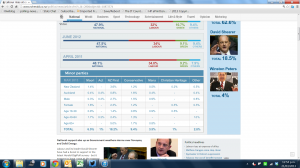Congratulations to Nick Iversen for his nomination of this stat of the week from the NZ Herald:
This story states that “Public opinion has turned …” To justify this they quote statistics from surveys done in 1012 and 2103.
But the surveys are not comparable. They asked different questions.
The 2012 survey questions and results:
I disapprove 40.3%
I approve 19.6%
I conditionally approve 37.7%
The 2013 survey questions and results:
I disapprove 61.5%
I approve 33.8%
When the condition (that the number of pokie machines drops across the city) was removed from the 2013 survey those respondents had to switch to a new answer.
My guess is that most would have switched to “I disapprove” because their approval was conditional and the condition has now been removed. If so then the 2012 survey would have had results:
I disapprove 78.0%
I approve 19.6%
In that case public opinion has moved in the opposite direction to that in the headline.
Even if only half would have switched the figures would have been
I disapprove 59.2%
I approve 38.5%
and it still looks like the opposite to the headline.
The headline is pure fiction. The numbers don’t support it. The two surveys can’t be compared.
For more, see Thomas’ post on this.
